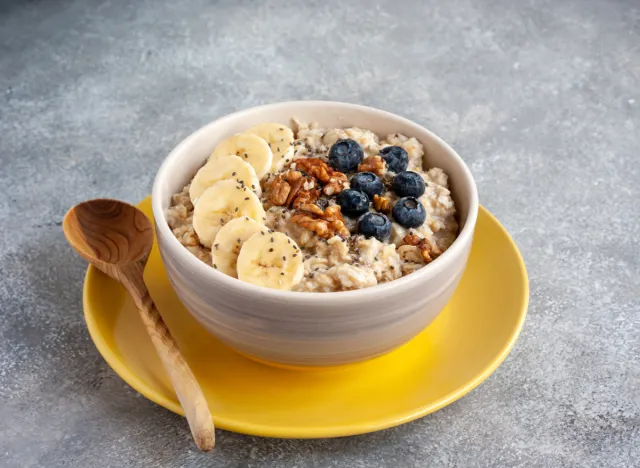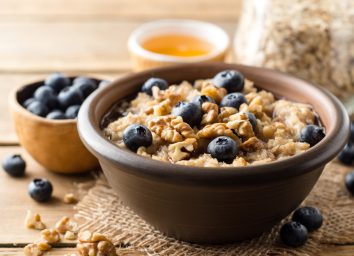One Major Effect Oatmeal Has On Your Cholesterol, Says Dietitian

Oatmeal is one of the most popular breakfast choices in the United States, and it’s for good reason. Not only is it delicious, but the health benefits of oatmeal are through the roof. Oats have been known to help manage blood sugar, improve your gut microbiome and gut health, help you manage your weight, and even help you lower your cholesterol.
According to our medical expert Lauren Manaker, MS, RDN, author of The First Time Mom’s Pregnancy Cookbook and Fueling Male Fertility, oatmeal can help you lower or manage your LDL cholesterol because of its unique fiber content.
“Oatmeal has a fiber called beta-glucans, and this fiber is a superstar addition to a diet when people are trying to lower their cholesterol, as this fiber essentially ‘binds’ LDL cholesterol, allowing it to be removed from the body before it is absorbed,” says Manaker.
Continue reading to learn more about how oatmeal can lower cholesterol, and for more healthy heart tips, check out The Best Foods That Can Lower Your Risk of Heart Disease.

Oats are full of both soluble fiber and insoluble fiber, which is what gives them many health benefits. Soluble fiber turns into a gelatinous substance in your body and has been known to help specifically with cholesterol, blood sugar, and healthy digestion.
Insoluble fiber does not dissolve and instead helps you stay regular and softens your stool. Both types are important in maintaining a healthy diet.
Foods like oats, wheat, and barley contain a very specific type of fiber called beta-glucans, which falls under the category of soluble fiber.
“The evidence surrounding the benefit of oat beta-glucans on cholesterol is so strong that the FDA authorized the use of a heart-health claim whenever oats are used in a food,” says Manaker.
According to a report published in The International Journal of Molecular Sciences, beta-glucans can help you manage your cholesterol levels by altering how much cholesterol is absorbed into your body when you digest food.
Another study published in Nutrients found that those who consumed 3 grams of beta-glucans every day for eight weeks were able to lower their LDL cholesterol (the “bad” cholesterol) by almost 15%.

The unique fiber content of oatmeal, especially its beta-glucans, is one of the main reasons it is so heart-healthy and effective in lowering your cholesterol.
But oatmeal is just one part of the equation. Lowering your cholesterol oftentimes requires multiple lifestyle changes, such as limiting your consumption of alcohol, saturated fats, and trans fats, while increasing your amount of healthy fats, fiber, and daily exercise. So grab a bowl of your favorite oatmeal, and enjoy a heart-healthy start to your day!








